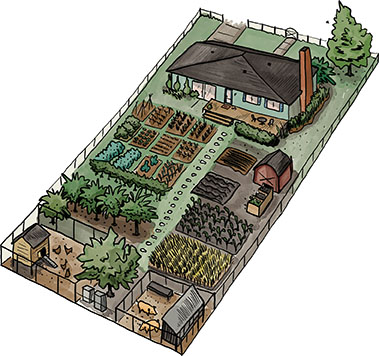
Do you dream of gathering fresh eggs from your own hens? Does saving money and living naturally appeal to you? Transform your backyard into a homestead that puts food on the table, reduces household waste, and helps you return to your roots.
At one time homesteading allowed settlers to move west and claim land by farming it. Today, modern homesteaders choose to raise backyard chickens and tend gardens and orchards to increase sustainability and self-reliance. You, too, can make your backyard a productive oasis in an uncertain world.
No matter why you wish to homestead, you’ll find the simple life can be a lot of work. Without a plan to follow and goals to strive for, your path to self-reliance could be rather rocky. Let’s dig in and see if you’re ready to start.
1. Do you want to reduce waste and increase sustainability?
2. Will you have time to care for your homestead?
3. Are you able to do physical labor?
4. How much space do you have?

Your responses will shape your homestead plans and projects. With a quarter acre, you could raise small livestock and grow fruits, nuts, vegetables, herbs, and grains. The harvest from your backyard could reduce your grocery bills, fill your pantry, and provide additional income.
Your growing conditions, budget, and time will determine how much you can grow. Assuming you have average conditions and an average lot, in one year you have the potential to raise the following:
♦ 6 laying hens to provide 1,200 eggs
♦ 25 meat chickens to provide 125 pounds of meat
♦ 2 turkeys for the holidays
♦ 2 goats to provide 180 gallons of milk
♦ 2 beehives to provide 80 to 120 pounds of honey
♦ 6 dwarf fruit trees to provide 6 to 24 bushels of fruit
♦ 4 nut trees to provide 50 to 150 pounds of nuts
♦ Small grains to provide up to 3 bushels of field corn
♦ Raised beds to provide 300 to 2,500 pounds of vegetables
To produce these yields, you’ll need to purchase livestock feed, plant intensively, and invest in tools and supplies. You can also begin on a smaller scale and increase production as you gain experience.
Throughout this book, you’ll find helpful checklists, step-by-step instructions, and budget breakdowns to help you determine which projects to tackle. Beginners are often tempted to try everything immediately, but keep your expectations realistic and enjoy the journey to self-reliance. Let’s get started.